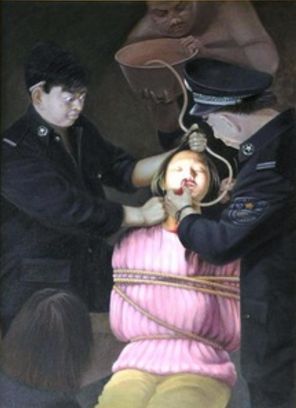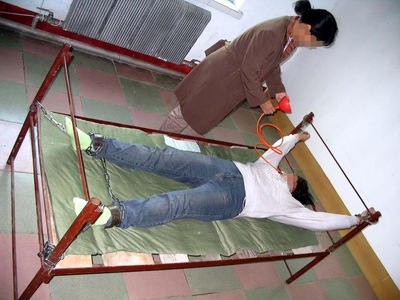May 25, 2016 | “I suffered 13 years of unjust imprisonment for my belief. Thirteen years is not a short time—I was 29 when it started and am now a gray-haired, middle-aged woman. My daughter, who was three at the time, spent 13 of her 16 years of life without mum by her side.”
“I had lost most of my family—one parent passed away in 2008 and another in 2011. My husband divorced me and re-married. I lost my apartment and my job. All I had left was my daughter.”
Ms. Fu Yan became teary-eyed when she recalled what it was like to regain her freedom after more than ten years as a prisoner of conscience.
Born in 1972 in Dashiqiao City, the Liaoning Province native began her cultivation in Falun Gong in 1998, when she witnessed her mother take up the practice and miraculously regain her health.
When Jiang Zemin, then-head of the Chinese Communist Party, launched the persecution of the spiritual practice, local authorities targeted Ms. Fu, which led to her August 2001 arrest and eventual 13 years in prison.
“I started to practice Falun Gong in December 1998. The persecution started less than a year later. I had not realized how profound Falun Gong truly is, but during my 13 years in prison, I realized how corrupt the communist regime is and became more and more convinced that Falun Dafa is good.”
Ms. Fu submitted her criminal complaint against Jiang Zemin in June 2015. The complaint holds him responsible for starting the persecution and for all that she and her family have suffered.
August 2001 Arrest in Beijing
My husband and I were in Beijing to launch our company in August 2001. Police from the Gangdu police station of our city, with officers from the Ministry of State Security, stopped me on the street on August 21.
More than 10 police officers beat me in broad daylight. I was blindfolded and taken to a detention center in Beijing. I was beaten again by eight male officers and injected with an unknown substance.
At the detention center, two officers held each of my arms and another grabbed my hair while my photo was taken. An officer covered my head with a black bag and hit me so hard that my mouth was filled with blood. I was charged 250 yuan for the one night I spent there—more expensive than a hotel room.
I was taken back to Dashiqiao the following day. To make me cooperate, the police arrested my mother Tong Shuping, also a practitioner, and my non-practitioner husband Zhang Chonghua. They were detained for months at the Dashiqiao Detention Center. With both of her parents arrested, my three-year-old daughter had to stay with my mother-in-law.
My sister Fu Ying and Fu Qiang were also illegally detained during that time for practicing Falun Gong. It was a nightmare for my father.
Force-Fed at Masanjia Forced Labor Camp
When the news of Falun Gong practitioner Li Yanhua’s death was published on the Minghui website in October 2001, I was accused of exposing details surrounding her death on the Internet. Based on that allegation, I was sent to the notorious Masanjia Forced Labor Camp.
To protest being illegally detained at the forced labor camp, I went on a hunger strike. I was force-fed and given fluids intravenously every day for two weeks. More than ten people were involved in my force-feeding. They held me down, inserted a thick tube into my mouth and down my throat, and fed me food and water.
It was extremely painful, and the tube was always covered with blood when they pulled it out. Ridiculously, the labor camp charged me 700 yuan for what they called “medical treatment.”
I was made to do heavy labor during the day at the camp. At night, I was not allowed to sleep and was forced to watch propaganda videos slandering Falun Gong.
Division head Qiu came to the workshop one night in March 2002. He turned on the TV and changed the channel to an interview program. It was about the death of Ms. Li Yanhua. I was surprised to see my picture in the footage, because I was never interviewed. I then realized what had happened—they just took some still frames out of the footage from a security camera at the labor camp. The entire interview was fabricated.

Illegally Sentenced
I was transferred back to the Dashiqiao Detention Center in August 2002. On February 17, 2003 I was convicted and sentenced to eight years in prison for exposing the facts surrounding Ms. Li Yanhua’s death. No evidence or witness was presented in court proving I was even involved in the case. I was crushed.
I had a heart attack on March 21 and was in critical condition. I was taken to the Dashiqiao Central Hospital, from which I escaped six days later.
Arrested Again and Sent to Prison
I temporarily stayed at a practitioner’s home in Anshan City after the escape, but was arrested again on May 24, 2003 with ten local practitioners. Officers who participated in the arrest were from the Jianyi Police Station of Dashiqiao City Police Department and Anshan Domestic Security Division.
Two officers beat me during the arrest and used their feet to stomp on my head. Covered in wounds and bruises, I was taken back to the Dashiqiao Detention Center that night.
My hands were cuffed so tightly that they remained numb for almost a year. I still cannot stretch my ring finger of my right hand.
When I protested the abuse and went on a hunger strike, I was held down by male inmates and force-fed through my nose. A doctor inserted a tube and rotated it back and forth, which caused excruciating pain.
Four people escorted me to Liaoning Women’s Prison in Shenyang the next day. It was during the outbreak of SARS at the time, so they gave me an injection to reduce my fever before we arrived.
I was given a full physical examination when we arrived. Two male inmates held me down while my private parts were checked. The test results were changed so I could be admitted to the prison.
Force-Fed at Liaoning Women’s Prison
Because of the SARS scare, the prison would not accept new inmates. I was the only exception approved by the Liaoning Province Political and Legal Affairs Committee.
I was confined to a small cell and monitored by four team leads and four inmates. One inmate beat me.
I continued with my hunger strike and underwent the most inhumane method of force-feeding.
I was taken to a room with many beds. My hands and feet were cuffed to the four corners of a bed for the entire two weeks that I was there, and the tube for force-feeding was never taken out. I was fed a corn mixture every few hours.
There were some other practitioners who had been on a hunger strike for more than three months and were nothing but skin and bones. I doubted that they would ever recover after being cuffed to a bed in such a position for so long.
My sentence was extended to 13 years and 6 months on August 4, 2003. After the nearly two years I had already spent at the detention centre and the forced labor camp, I was looking at another 11 years in prison.

Hard Labor and Long Hours
At the prison, I was forced to perform heavy labor each day for more than 10 hours and sometimes 20 hours. I was forced to get up between 4am and 5am and worked 12-hour days. Sometimes, I was allowed a short nap at the workshop and went right back to work the next day.
When other practitioners and I were moved to a new facility at the end of 2003, we worked 20-hour days for 40 days in a row. We were allowed to use the bathrooms three times a day.
In 2004 and 2005, we worked every day of the year without a day off. After working for 15 to 16 hours at the workshop, we sometimes had to take work back to our cells. This situation only changed in 2009, when we started to have some Sundays off. When I was released in November 2014, we worked 12-hour days and had only Sundays off.
Poor Living and Working Conditions
We worked long hours with poor nutrition. From 2004 to 2006, we had rice three times a week and were given buns made mostly of husks and bran for the rest of the meals. We had the same few simple vegetables all year round.
We showered with cold water even in winter, when the temperature fell below freezing. Before 2008, there was no hot water to drink at the workshop. As many as six inmates shared one thermos of hot water a day.
By the time I was released in 2014, four inmates shared one bottle of hot water at each cell, and more than ten people shared one bottle at the workshop. The water heater was often out of order, in which case we had no hot water.
The pit toilets were often backed up and always took a long time to get fixed. Once, seven out of sixteen toilets were broken, and 150 inmates on the same floor had to share nine toilets. The bathroom was locked until a certain hour in the morning, and everyone was forced to wait in line to use the only toilets that worked.
Criminal inmates in charge of the workshops beat and verbally abused slow workers. They often took people to the office and beat them with electric batons. We all heard the screaming. The physical and verbal abuse eased after 2008, but the inmates were still mistreated.
For the amount of work we did and the profit we generated, we were not supplied with basic needs. Our families brought us glue brushes or gloves for work.
Of the more than ten years I was detained there, I was given seven yuan a month. We had to pay for toilet paper that cost about three and half yuan a roll. In some months, I did not even receive the seven yuan.
Refusing to Perform Hard Labor and Confined to a Solitary Cell
I refused to work toward the end of 2009, so the guards confined me to a solitary cell for two months. I was stripped naked, searched, and not given winter clothes. It was so cold that I couldn’t sleep—I walked back and forth to keep warm.
The cell was only two square meters with two doors. Cold air leaked through a door that froze over. Besides the thin clothes I had on, I had only a roll of toilet paper in the cell. I stuffed toilet paper in my pants to keep warm and used sticky corn bread to keep the toilet paper in place. I made a “cave” in the corner of the cell and curled up underneath during cold winter nights.
I was given one piece of corn bread at each meal, with pickles for breakfast and broth for the other two meals of the day. I drank tap water and was not allowed to brush my teeth.
I was transferred out of confinement two months later to a special unit specifically set up for “transforming” Falun Gong practitioners. I stayed there for more than a year. I was confined to a solitary cell again in December 2010. In March 2011, I was sent back to the special unit for four months.
During my ten-plus in Liaoning Women’s Prison, I was often denied visitations, the longest period being a year and a half. My sister Fu Ying was held at the same prison for nine years, but we never saw each other.
Background of Lawsuit
In 1999, Jiang Zemin, as head of the Chinese Communist Party, overrode other Politburo standing committee members and launched the violent suppression of Falun Gong.
The persecution has led to the deaths of many Falun Gong practitioners in the past 16 years. More have been tortured for their belief and even killed for their organs. Jiang Zemin is directly responsible for the inception and continuation of the brutal persecution.
Under his personal direction, the Chinese Communist Party established an extralegal security organ, the “610 Office,” on June 10, 1999. The organization overrides police forces and the judicial system in carrying out Jiang’s directive regarding Falun Gong: to ruin their reputations, cut off their financial resources, and destroy them physically.
Chinese law allows for citizens to be plaintiffs in criminal cases, and many practitioners are now exercising that right to file criminal complaints against the former dictator.
(Clearwisdom)

